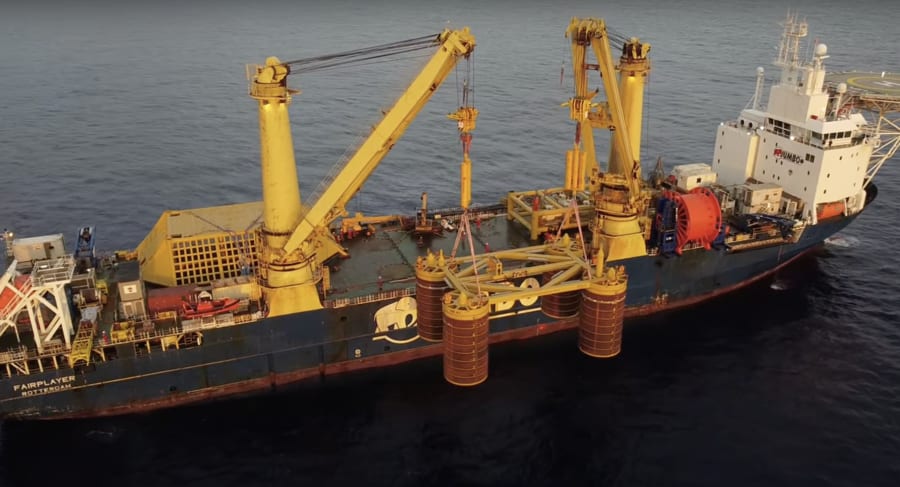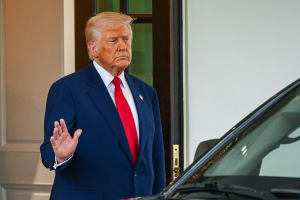Hezbollah could potentially attack Israel, using maritime border dispute as the excuse
The terror organization has warned Israel against drilling for gas at the Karish site; Lebanese president calls it “a provocation and a hostile act”

Israel is preparing to protect its new gas-drilling platform from attacks by the Iranian-backed terror group Hezbollah, Israel’s Kan News reported on Sunday.
The new Karish gas rig, off Israel’s Mediterranean coast, arrived on Sunday and is already expected to start operating within the next few months. Israel plans to protect the site with Navy vessels, including submarines and a naval version of the Iron Dome missile defense system.
The terror organization has warned Israel against searching and drilling for gas in the region in the absence of any formal agreement with Lebanon on the matter. Hezbollah threatened to use military force to protect Lebanon’s business rights. The Lebanese government considers the 330-square-mile-wide area – containing large deposits of natural gas – to be disputed.
In the past year, Israel and Lebanon have held talks about the disputed area, according to a map registered with the United Nations in 2011. Lebanon, however, since 2020, has demanded that an additional 552 square miles, which extends into the Karish gas field, be part of the negotiations.
According to estimates from Israel’s Ministry of Energy, the Karish gas site will presumably provide half of Israel’s natural gas needs and will facilitate the export of more natural gas to Egypt and Jordan.
On Sunday, Lebanese President Michel Aoun warned Israel against drilling at Karish.
“Any action or activity in the disputed area represents a provocation and a hostile act,” the president’s office stated. Lebanon’s Prime Minister Najib Mikati accused Israel of “encroaching on Lebanon’s maritime wealth, and imposing a fait accompli in a disputed area,” while calling Israel’s actions “extremely dangerous.”
According to the Times of Israel, the Lebanese president’s office also said that Lebanon informed the UN in February that Karish is part of the disputed area and that the UN Security Council should prevent Israel from drilling there in order “to avoid steps that could form a threat to international peace and security.”
In response, Israel said that the gas field is not in disputed territory and that Lebanon should return to indirect negotiations with Israel, with the U.S. as a mediator.
“It’s not even (above) the southern line that Lebanon submitted to the United Nations. Even according to the United Nations, it’s not in Lebanon,” Israel’s Energy Minister Karine Elharrar argued.
On Monday, Lebanon invited Amos Hochstein, a senior energy and security advisor at the U.S. State Department – who has been an intermediary between Lebanon and Israel – to return to Beirut for talks and “to work on concluding them as soon as possible in order to prevent any escalation that will not serve the stability that the region is currently witnessing.”
Not surprisingly, Hezbollah is unhappy with U.S. mediation of the conflict. In May, the terrorist regime “slammed” Hochstein, using anti-Semitic terms to convey that “Jewish envoys” were not wanted, according to the Jerusalem Post.
The Lebanese president’s warnings to Israel, and Hezbollah’s threats, are not so much about the disputed territory and natural gas, according to The Jerusalem Post’s Seth Frantzman, but rather an ill-disguised attempt at clinging to power after Hezbollah’s allies lost significant ground in the last Lebanese elections. President Michel Aoun is an ally of Hezbollah.
“The real goal of its authorities, after seeing how Hezbollah’s allies performed badly in the last elections, is to cling to power through threats of conflict with Israel,” Frantzman wrote on Monday.
“This is part of their populist plot, and it is likely being encouraged by Iran to create a casus belli, meaning an excuse for conflict that will enable Hezbollah to claim it is ‘resisting’ Israel. This is part of the narrative that Iran has used for years: getting Hezbollah to create fake excuses for the need to keep stockpiling Iranian-supplied weapons.”

The All Israel News Staff is a team of journalists in Israel.














